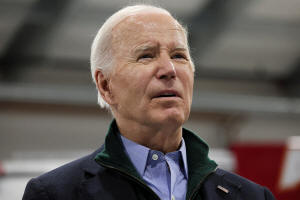Biden's strategy on Yemen aims to weaken, not destroy, Houthis
 Send a link to a friend
Send a link to a friend
 [January 18, 2024]
By Phil Stewart, Idrees Ali and Jonathan Landay [January 18, 2024]
By Phil Stewart, Idrees Ali and Jonathan Landay
WASHINGTON (Reuters) - U.S. President Joe Biden's emerging strategy on
Yemen aims to weaken the Houthi militants but stops well short of trying
to defeat the group or directly address Iran, the Houthi's main sponsor,
raising risks of prolonged conflict, experts say.
The strategy - a blend of limited military strikes and sanctions -
appears aimed at preventing a wider Middle East conflict even as
Washington seeks to punish the Houthis for their attacks on Red Sea
shipping.
But it is unclear whether it will accomplish Biden's main goal: halting
the militants' attacks.
Analysts warn a middle-road attempt could mean continued instability
along a vital global shipping chokepoint without removing the risk of
greater regional military confrontation.
"I think the strategy is sustainable. I just don't think it's going to
work," said Seth Jones at the Center for Strategic and International
Studies think tank.
"Limited strikes against Houthi targets are not going to deter attacks
around the Red Sea."
The Houthis say their attacks on Red Sea shipping are intended to
support Palestinians against Israel, a popular cause in Yemen. The
Houthis' campaign has disrupted global commerce, stoked fears of
inflation and deepened concern that fallout from the Israel-Hamas war
could destabilize the Middle East.

After months of warnings, Biden last week authorized a wave of
airstrikes against Houthi military targets, hitting missiles, drones and
radar stations. But the Houthis have kept up their attacks.
On Tuesday, the U.S. military struck four anti-ship ballistic missiles
as they prepared to launch against Red Sea targets and on Wednesday
strikes destroyed 14 more. Both actions suggest the U.S. is choosing
military targets based on real-time intelligence.
"If we see a target, we will hit it," one U.S. official said.
Biden's national security adviser has publicly hinted at the likely need
for more military action.
"We anticipated the Houthis would continue to try to hold this critical
artery at risk and we continue to reserve the right to take further
action," Jake Sullivan said on Tuesday.
Some U.S. officials and experts believe the Houthis welcome the
confrontation with the United States, saying it helps them win popular
support in Yemen and burnishes their brand in the Middle East as part of
the Iran-backed "Axis of Resistance."
And the Houthis appear to believe they can endure U.S. bombings, even if
some stocks of missiles and drones are destroyed.

[to top of second column]
|

U.S. President Joe Biden speaks to the press, as he visits Allentown
Fire Training Academy, in Allentown, Pennsylvania, U.S., January 12,
2024. REUTERS/Leah Millis/File Photo

"The fact of the matter is that (drones and missiles are) relatively
easily replaced," said Gerald Feierstein, a former U.S. ambassador
to Yemen. "Whether they get the motors or the guidance systems or
something else from Iran, they can put together the pieces
themselves."
TERRORIST DESIGNATION
The U.S. strategy of balanced escalation was apparent on Wednesday
when the Biden administration returned the Houthis to a list of
terrorist groups.
But it delayed implementation for 30 days, to help limit the impact
on humanitarian aid to Yemen, and Biden also stopped short of
relisting the group as a "foreign terrorist organization (FTO)."
The FTO designation includes far stricter measures than the Houthis
new designation as a Specially Designated Global Terrorist" (SDGT).
Gregory Johnsen, a non-resident fellow with the Arab Gulf States
Institute, said he doubted the step would be effective.
"This is largely a symbolic act that's going to have some
humanitarian repercussions, but it's not going to do anything to
prevent the Houthis from carrying out these attacks," he said.
One senior Biden administration official, briefing reporters on the
decision, said Washington was still "committed to resolving the
conflict in Yemen" and to reach a durable ceasefire between Saudi
Arabia and the Houthis.
Jonathan Lord, director of the Middle East security program at the
Center for a New American Security, said Biden was hoping to deter
the Houthis and effectively "stick the landing in some sort of
negotiated peace in Yemen."

But Lord, a former Pentagon official, said the strategy largely
ignored the Houthis main backer - Iran - and would tie up valuable,
and costly, U.S. Navy assets.
"Iran can provide the Houthis with capabilities that are
asymmetrically cheaper," Lord said.
"U.S. capabilities, by and large, live off of aircraft carriers and
other naval vessels which need to go in and out of the region, but
also are needed elsewhere in the world."
(Additional reporting by Simon Lewis Editing by Don Durfee and
Michael Perry)
[© 2024 Thomson Reuters. All rights reserved.]This material
may not be published, broadcast, rewritten or redistributed.
Thompson Reuters is solely responsible for this content. |